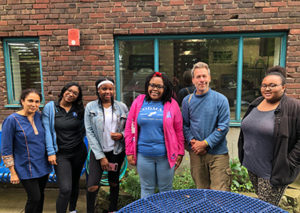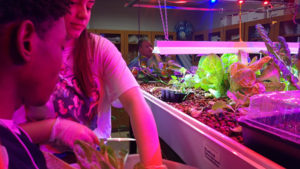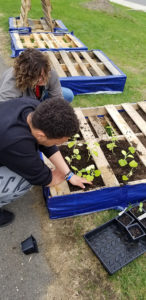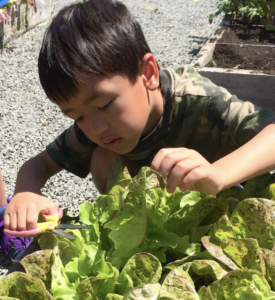The 2018-19 Massachusetts Farm to School Institute has come to a close and the eight participating school teams achieved some amazing things! Read below for some key lessons learned and highlights of how this diverse group of schools is putting farm to school into action. We look forward to welcoming seven new school teams for the 2019-20 Institute in the fall.
 Codman Academy demonstrates that students can – and should – be at the forefront of Farm to School Programs. Their Farm to School Planning Team identified student empowerment as a core principle of their program goals during the 2018-19 MA Farm to School Institute Fall Retreat. As a result, one program implemented this year includes the student Food Ambassadors program, a core team of tenth and eleventh graders who commit to serving two-year terms in food and nutrition leadership at Codman. Throughout this program, Food Ambassadors learn, lead, and give back to their community.
Codman Academy demonstrates that students can – and should – be at the forefront of Farm to School Programs. Their Farm to School Planning Team identified student empowerment as a core principle of their program goals during the 2018-19 MA Farm to School Institute Fall Retreat. As a result, one program implemented this year includes the student Food Ambassadors program, a core team of tenth and eleventh graders who commit to serving two-year terms in food and nutrition leadership at Codman. Throughout this program, Food Ambassadors learn, lead, and give back to their community.
The inaugural team of Food Ambassadors have taken on a number of projects this year, whether individually or as a group, such as: building garden beds at the school’s new urban garden site, watering and maintaining the beds so they are in good shape for classes to grow and harvest from during the school year, presenting to statewide audiences at a MA Food Policy Council meeting and the MA Food Systems Collaborative Summit, testifying before MA legislators on Farm to School policy, leading community taste tests of fresh fruits and vegetables at the Codman Square Health Center (which adjoins the school building) and surveying peers about their food preferences in the school cafeteria to improve the quality and variety of school meals and increase meal participation. Two Food Ambassadors also surveyed neighborhood convenience stores about their healthy and fresh food options. These student leaders are making a lasting and meaningful impact on their school community, and at the same time they are growing in experience and confidence. Students make wonderful leaders and serve as positive role models for their peers.
A student Food Ambassador program can be easily adaptable by other schools. Best practices include recruiting teaching staff to support these students, and keeping a suggested list of projects/activities that students can empower themselves to take on. Even if the program’s tasks vary from school to school, it is incredibly valuable to look to your students to be your farm to school champions.
 From student led culinary pop-ups, to placing grow-racks in the schools’ cafeterias, the Waltham School Nutrition team has demonstrated time and again their desire to innovate to bring students the best food possible. One area the team was determined to further develop this year was their sourcing of products from local farms. While they had a long-standing relationship with a neighboring farm, Waltham Fields Community Farm, this farm’s size and other marketing channels limited the volume of product they could offer to the schools. Waltham set out to find another farm that could meet this need and found a great partner in nearby Drumlin Farm in Lincoln, MA. This year’s purchasing focused on a few select crops such as butternut squash and potatoes.
From student led culinary pop-ups, to placing grow-racks in the schools’ cafeterias, the Waltham School Nutrition team has demonstrated time and again their desire to innovate to bring students the best food possible. One area the team was determined to further develop this year was their sourcing of products from local farms. While they had a long-standing relationship with a neighboring farm, Waltham Fields Community Farm, this farm’s size and other marketing channels limited the volume of product they could offer to the schools. Waltham set out to find another farm that could meet this need and found a great partner in nearby Drumlin Farm in Lincoln, MA. This year’s purchasing focused on a few select crops such as butternut squash and potatoes.
For the 2019-20 school year they plan to model their purchasing from Drumlin Farm on a Community Supported Agriculture system, but adapted to meet their unique needs as a school district. Waltham Schools will commit to purchasing a certain dollar value of food and the farm will provide the district with an assortment of the freshest products available each week, depending on the harvest. This kind of relationship allows schools to receive competitive pricing, but it necessitates a flexibility to work with a variety of farm products as they become seasonally available. The schools must have adept staff and the right tools to feature these products. This commitment to building staff capacity to work with different vegetables and introducing students to a wide range of items demonstrates the district’s willingness to innovate to make their program a success.
 Walking into the Amherst-Pelham (ARPS) high school cafeteria for the spring Farm to School Cultural Exchange community event, the energy was bustling. Music played overhead, families gathered around tables decorated with flags from around the world. Children gathered with community volunteers at a seed art activity table and played lawn games while parents visited exhibitor tables. Tables included information about school meals and ARPS’s ever-evolving Farm to School programs, such as Summit Academy’s new student-grown microgreens program. With the school’s indoor terraponics grow tower on display, families examined and sampled the fresh greens right off the plants. At different locations throughout the dining and exhibit space, attendees encountered bright green bags with questions on them (e.g., “What questions do you have about our farm to school program?” “Do you have a favorite recipe you would like to share?”), next to slips of paper on which everyone was invited to submit their responses. The ARPS Farm to School Planning Team gave a community presentation about new and ongoing efforts and invited attendees to add to the conversation by joining several working groups to support ARPS farm to school in the cafeteria, curriculum, and community.
Walking into the Amherst-Pelham (ARPS) high school cafeteria for the spring Farm to School Cultural Exchange community event, the energy was bustling. Music played overhead, families gathered around tables decorated with flags from around the world. Children gathered with community volunteers at a seed art activity table and played lawn games while parents visited exhibitor tables. Tables included information about school meals and ARPS’s ever-evolving Farm to School programs, such as Summit Academy’s new student-grown microgreens program. With the school’s indoor terraponics grow tower on display, families examined and sampled the fresh greens right off the plants. At different locations throughout the dining and exhibit space, attendees encountered bright green bags with questions on them (e.g., “What questions do you have about our farm to school program?” “Do you have a favorite recipe you would like to share?”), next to slips of paper on which everyone was invited to submit their responses. The ARPS Farm to School Planning Team gave a community presentation about new and ongoing efforts and invited attendees to add to the conversation by joining several working groups to support ARPS farm to school in the cafeteria, curriculum, and community.
For the main event, families sampled a variety of delicious dishes, featuring local ingredients, prepared by school food service staff and representative of their own diverse cultural traditions. Recipes such as chicken with veggie rice (Puerto Rico), pigeon peas and cucumber-ginger juice (Jamaica), and kapusta (Poland) were served alongside dishes from Korea, Israel, Italy, USA, Ireland, Scotland, Portugal, and England. Printouts of the recipes were made available to guests alongside the dishes, and a recipe book from the event was made available for download. Many of the 100+ attendees commented on how much they enjoyed the food and the event as a whole, some noting that the incorporation of many cultures was a true highlight of the potential of this nascent farm to school program.
The Farm to School Cultural Exchange community event was a huge success and a testament to how farm to school programs can be inclusive and accessible to all. It demonstrates how bringing school families together and sharing culturally relevant meals while supporting local growers fosters a stronger, healthier, and more interconnected community.
Being a small, rural school with less than one-hundred students is not stopping the Farm to School team at Conwell Elementary from achieving their goals of providing fresh, local food to their students. Understanding that farm deliveries to their location may not be possible, the Worthington team partnered with nearby New Hingham Elementary to pilot a combined purchasing plan from local farms. Farmers and distributors are able to make deliveries to a single location while providing two school districts with local products. The Worthington team is actively working with a local Community Development Corporation to identify potential farms to work with and find solutions to distribution challenges that may arise.
In a small school community like R.H. Conwell’s, parents can play a role in the Farm to School efforts. Superintendent and Principal at R.H. Conwell, Gretchen Morse-Dobosz, has begun discussing procurement possibilities with a parent who owns a nearby Inn that will be supplying local food to its customers. Superintendent Morse-Dobosz plans to utilize the same local growers and distributors as the business and maximize delivery opportunities and efficiency. The Farm to School team from Conwell Elementary is a fabulous example of a small school district connecting with community partners in order to overcome procurement obstacles.
 While significant farm to school activity was underway in the Medford Public Schools before this school year, the farm to school team knew that to take the program to the next level, they would need to raise the program’s profile to generate more public support. To do this they created a shared, immediately recognizable identity for the program, which they branded Medford Schoolhouse Farms. With a fresh logo and facebook page, they use this consistent branding to ensure student recognition of the various farm to school programs occurring within each school.
While significant farm to school activity was underway in the Medford Public Schools before this school year, the farm to school team knew that to take the program to the next level, they would need to raise the program’s profile to generate more public support. To do this they created a shared, immediately recognizable identity for the program, which they branded Medford Schoolhouse Farms. With a fresh logo and facebook page, they use this consistent branding to ensure student recognition of the various farm to school programs occurring within each school.
The Medford Schoolhouse Farms network serves to share resources, pool fundraising efforts and connect existing garden-based efforts throughout the district. From an elementary hydroponics club to a high school aquaponics program, Medford schools are focused on giving students hands-on growing experiences and bringing student-grown foods into the cafeteria. The latest growing space to be developed is the high school’s mini-orchard, now home to an outdoor classroom. These spaces not only provide more experiential education opportunities for students, but they continue to make visible the farm to school program to the whole school community. The team is using these unique locations to invite senior administrators to celebrate the success of the farm to school program as they set their sights on even more ambitious farm to school initiatives.
 Students and teachers from the Cornerstone program at Hoosac Valley High School are leading their school’s farm to school movement. Dubbed Cornerstone Grown, students are making plans for the high school’s first ever school garden and enlisting help from their peers in a timber framing class.
Students and teachers from the Cornerstone program at Hoosac Valley High School are leading their school’s farm to school movement. Dubbed Cornerstone Grown, students are making plans for the high school’s first ever school garden and enlisting help from their peers in a timber framing class.
Students join the Cornerstone classroom because they have struggled in the past with traditional classroom settings. Amanda Brooks-Clemeno, the lead teacher of Cornerstone, employs many strategies to allow her students to thrive while feeling supported and encouraged to work outside their comfort zones. A Farm to School program was a natural fit, as Brooks-Clemano explains, “Any activity that happens outdoors, or anything that gives these students ownership and pride in accomplishment, results in entire days without behavior issues because the kids are too focused and too excited about the project at hand.” Eventually, Cornerstone students will harvest from the gardens, be involved with marketing which products are being featured in the school meals program, and will partner with a local grocery store or farmer’s market to sell the excess produce in order to maintain their school garden costs.
 Hawlemont Regional Elementary School’s HAY Program (Hawlemont Agriculture and You) exposes their students (grades PK-6) to an array of agriculture and environmental-based learning experiences. The school is currently home to 17 raised beds, 2 producing fruit trees, 12 fruit tree saplings, 2 honey bee hives, and a large greenhouse. HAY worked with the school’s district business office to become a “standard” vendor, which enables them to donate student-grown foods to the cafeteria. They currently donate about 5% of their produce harvest to the school cafeteria in addition to selling eggs and jam. The HAY program is able to provide competitive pricing to the cafeteria by selling the bulk of the harvest at the Hawlemont farmer’s market, either as fresh produce or as canned goods, such as pasta sauce or grape jelly. Participating and organizing the school’s farmer’s market also helps build community support and farmer relationships throughout the region. The cafeteria and farmer’s market sales help support and sustain the HAY program which provides a variety of educational opportunities to the students.
Hawlemont Regional Elementary School’s HAY Program (Hawlemont Agriculture and You) exposes their students (grades PK-6) to an array of agriculture and environmental-based learning experiences. The school is currently home to 17 raised beds, 2 producing fruit trees, 12 fruit tree saplings, 2 honey bee hives, and a large greenhouse. HAY worked with the school’s district business office to become a “standard” vendor, which enables them to donate student-grown foods to the cafeteria. They currently donate about 5% of their produce harvest to the school cafeteria in addition to selling eggs and jam. The HAY program is able to provide competitive pricing to the cafeteria by selling the bulk of the harvest at the Hawlemont farmer’s market, either as fresh produce or as canned goods, such as pasta sauce or grape jelly. Participating and organizing the school’s farmer’s market also helps build community support and farmer relationships throughout the region. The cafeteria and farmer’s market sales help support and sustain the HAY program which provides a variety of educational opportunities to the students.
At the start of the HAY program in 2015 Hawlemont teachers worked to develop integrative science curriculum using features of the program. For example, fourth graders research and write about honey bees and local pollinators to meet ELA standards while also being the school beekeepers. The connection to this incredible real-life project creates an immense amount of engagement and ownership in their work in the classroom and in the field. Each grade now has at least one unit that is directly tied to the HAY program. Furthermore, each class takes HAY once a week to delve deeper into agriculture concepts and connections. They are also responsible for barn chores to ensure good health and wellbeing for schoolyard animals. These units are shared and available for district use, and often shared with interested neighboring schools. Hawlemont is now focusing its efforts in expanding curriculum connections across all subjects and incorporating these resources into regular professional development for staff.
Hands-on learning, greenhouse classrooms, school gardens, culinary programs, and student
engagement were already apart of the culture at Pathfinder Regional Vocational Technical High School. So when Pathfinder set out to expand their farm to school programming they looked to their unique position as a vocational high school and how to leverage those strengths. Through their participation in the Massachusetts Farm to School Institute Pathfinder first focused on integrating culinary and horticulture lessons with a focus on the growth and seasonality of local foods. The horticulture program began experimenting with growing produce for the school cafeteria as well as the school restaurant– both of which are student run. Leafy greens, microgreens, potatoes, herbs, radishes and edible flowers were all grown in Pathfinder’s greenhouses. The culinary and horticulture students, under the guidance of their instructors, also started offering taste tests for their peers in order to promote the healthy local foods.
In addition, students in the Future Farmers of America (FFA-Horticulture) and American Culinary Federation (ACF-Culinary) used the farm to school activities as a project for a competition and accreditation certification. ACF has a sustainability module built into their curriculum which has been implemented in the culinary program to compliment the locally sourced ingredients. In addition to the collaboration between culinary and horticulture, Pathfinder is expanding team collaboration to include lessons regarding healthy food choices and local foods into their science classes. The Business Technology program of Pathfinder has also been instrumental in the promotion of the farm to school initiative and has featured this through their social media avenues. Building upon the existing structures within a vocational school, Pathfinder has expanded and deepened their farm to school programming across their classroom, cafeteria and greater school community.
Phone: (413) 253-3844
Email: info@massfarmtoschool.org